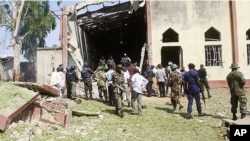ABUJA —
Thousands of Christians from across Nigeria attended a funeral Thursday for the victims of a church bombing two weeks ago that killed 10 and injured 100 people. Leaders called for peace between Christians and Muslims, saying the Islamist militants suspected in the bombing are at odds with the government, not the church.
Almost a dozen children, many still wrapped in bandages, fill the front pews of this packed church. They are survivors of the bomb blast that went off two weeks ago at this same Kaduna Roman Catholic church. While parishioners pray for their health, this man, Matias Peter, weeps for his lost niece.
When asked to speak about his loss, he quickly composes himself.
"We are gathered here to give her a decent burial and say goodbye until we meet again," he said. "My special prayer for her is, may God grant her eternal rest and peace."
Archbishop Mathew Man-oso Ndagoso is the head of the Roman Catholic church in northern Nigeria. At the service, he calls for unity between Muslims and Christians.
"Despite decades of sectarian violence, there is no war between the two major religions in Nigeria. Both groups are victims or terrorist attacks that incite violence, and damage Nigeria’s economy and international image," he says.
After the bombing two weeks ago the streets were quickly emptied and reprisal attacks were quelled. When churches were bombed in June, 100 people were killed in subsequent attacks before the city was locked down.
Reverend Father Bulus Kalus Luka says this funeral is especially difficult in a city where sectarian violence has caused so much suffering.
"The spirit of which the people are gathered to celebrate the funeral differs because we are together with hearts that are heavy with mixed feelings,” he said.
No one has claimed responsibility for the bombing, but the Islamist militant group known as Boko Haram has been blamed for over 700 deaths this year in attacks that include church bombings.
Diji Haruna Obadiya, the chairman of the youth branch of the Christian Association of Nigeria in Kaduna State, says Islamist militants have a beef with the government led by President Goodluck Jonathan, not Christians in general.
"Please we are not government," he said. "This church is not the Goodluck Jonathan church. This church has no minister in this church. This church has no government function. Why should this church be attacked?"
Outside the service, crowds of mourners fill the surrounding streets, which are still covered in rubble from the blast. Several buildings are destroyed or damaged and some local families say they are now sleeping outside.
Kaduna is in an area of Nigeria known as the “Middle Belt” where competing ethnicities, economic interests and political leanings fall almost exactly along religious lines. And like the country as a whole, it is roughly divided between a Muslim majority north and a Christian majority south.
Inside the damaged church, worshippers say despite their differences, they pray that the two groups can one day live in peace.
Ibrahima Yakubu contributed to this report from Kaduna.
Almost a dozen children, many still wrapped in bandages, fill the front pews of this packed church. They are survivors of the bomb blast that went off two weeks ago at this same Kaduna Roman Catholic church. While parishioners pray for their health, this man, Matias Peter, weeps for his lost niece.
When asked to speak about his loss, he quickly composes himself.
"We are gathered here to give her a decent burial and say goodbye until we meet again," he said. "My special prayer for her is, may God grant her eternal rest and peace."
Archbishop Mathew Man-oso Ndagoso is the head of the Roman Catholic church in northern Nigeria. At the service, he calls for unity between Muslims and Christians.
"Despite decades of sectarian violence, there is no war between the two major religions in Nigeria. Both groups are victims or terrorist attacks that incite violence, and damage Nigeria’s economy and international image," he says.
After the bombing two weeks ago the streets were quickly emptied and reprisal attacks were quelled. When churches were bombed in June, 100 people were killed in subsequent attacks before the city was locked down.
Reverend Father Bulus Kalus Luka says this funeral is especially difficult in a city where sectarian violence has caused so much suffering.
"The spirit of which the people are gathered to celebrate the funeral differs because we are together with hearts that are heavy with mixed feelings,” he said.
No one has claimed responsibility for the bombing, but the Islamist militant group known as Boko Haram has been blamed for over 700 deaths this year in attacks that include church bombings.
Diji Haruna Obadiya, the chairman of the youth branch of the Christian Association of Nigeria in Kaduna State, says Islamist militants have a beef with the government led by President Goodluck Jonathan, not Christians in general.
"Please we are not government," he said. "This church is not the Goodluck Jonathan church. This church has no minister in this church. This church has no government function. Why should this church be attacked?"
Outside the service, crowds of mourners fill the surrounding streets, which are still covered in rubble from the blast. Several buildings are destroyed or damaged and some local families say they are now sleeping outside.
Kaduna is in an area of Nigeria known as the “Middle Belt” where competing ethnicities, economic interests and political leanings fall almost exactly along religious lines. And like the country as a whole, it is roughly divided between a Muslim majority north and a Christian majority south.
Inside the damaged church, worshippers say despite their differences, they pray that the two groups can one day live in peace.
Ibrahima Yakubu contributed to this report from Kaduna.





